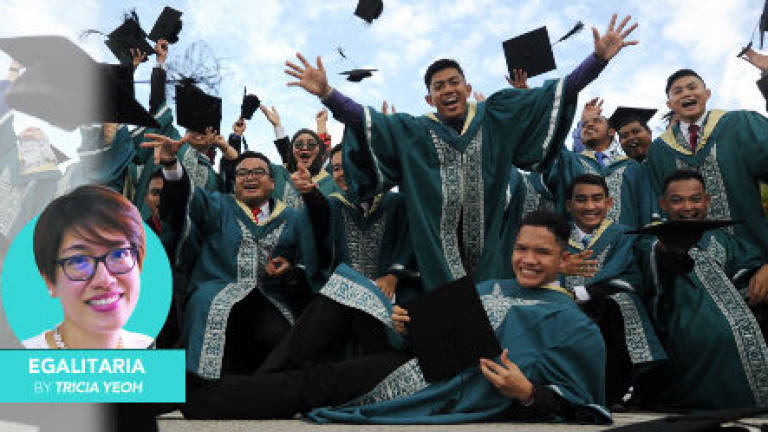Long road to university autonomy

LAST week, the minister of higher education said that Malaysia’s public universities are expected to record a rise in the QS World University Rankings this year. If this is true, then congratulations are due to the public universities concerned.
However, at an IDEAS National Higher Education conference last month, it was raised that international rankings alone may not be a fully comprehensive methodology of evaluating universities. International rankings do add value, and are an excellent tool in guiding students who are searching for potential universities for their subjects of interest, but one must admit they have limitations as well.
The QS World University Rankings, for instance, takes into consideration six factors: academic reputation, student-to-faculty ratio, citations per faculty, employer reputation, international faculty ratio and international student ratio. However, this might put undue pressure on universities to increase the international faculty staff members or international student intake regardless of the individuals’ quality – bumping up the scores and “gaming” the system, so to speak.
More important for the Malaysian context, nowhere does the methodology state that it takes into consideration the level of autonomy that universities exercise vis-à-vis the governments of their respective countries. This also applies to the Times Higher Education World University Rankings (which measures teaching, research, citations, international outlook and industry income).
This means that even if Malaysian public universities score well on all of these counts, in both rankings, it may still not address the elephant in the room, which is namely: the fact that our public universities still do not enjoy a level of real autonomy in both academia and administration. It is understood that the Ministry of Higher Education is attempting to gradually change this, which must be supported, but one hopes these will truly bear fruit in the long run.
An IDEAS report distributed at the conference quoted from an older report produced by a committee set up in 2005 to examine the direction of higher education in Malaysia, then chaired by Tan Sri Wan Zahid, which had among its many recommendations for the universities’ constitutions to enable professors to choose their own staff to join the universities’ Senate; to delegate all decision-making on university and management policy to the university’s board; and to ensure the appointment of all vice-chancellors is done openly and competitively to select the best candidate. The three that I quote here have yet to be implemented.
The lack of university autonomy is not new, and can be traced back to the passing of the Universities and University Colleges Act (UUCA) in 1971 and its more damaging amendments subsequently in 1975. Since then, the autonomy and independence universities once enjoyed pre-1971 have never been fully restored. Dr Wan Chang Da writes in his paper that a circular in 2016 from the Ministry of Finance stated that the vice-chancellor would have to seek permission from the board of directors, secretary-general of the Ministry of Higher Education and the chief secretary to the government to travel abroad for official duties. All other university staff would have to seek the permission of the vice-chancellor, board of directors and the secretary-general to travel.
Some public universities have been granted “autonomous” status, but they are still subject to the same governance framework as the civil service in salary, promotion criteria and procedures. As Wan writes, universities are not allowed to decide how to allocate funds and research grants and need to adhere to the procurement and financial procedures laid out by the Ministry of Finance and Treasury. Perhaps most importantly, the appointment of vice-chancellors is still not based on merit and lies at the discretion of the minister of higher education.
What is essential ultimately is that any attempt to make universities more autonomous needs to be accompanied by the necessary amendments to legislative and policy frameworks of higher education. This means that the UUCA would need to be amended to state clearly what kind of autonomy it is that is being granted to public universities. Spelling it out would make the governance structure and systems for public universities very clear, which we all know bureaucrats need to execute any policy.
Closely linked to the lack of university autonomy is that of academic freedom. Without the independence of a university’s leadership, how likely is it that they would stand by its academic staff when they pursue research projects, teach or publish papers that are considered “sensitive” to the government? Do academics in our universities have the freedom of inquiry to pursue scholarly work regardless of whose toes it steps on?
Most recently, Michael Ignatieff, rector and president of Hungary’s Central European University, wrote a long and powerful piece about what academic freedom means – especially now that his university is under attack and fighting to remain a free institution (a new piece of legislation has just passed that would require it to close). He says that those who believe in universities must proudly affirm that our freedom is not a privilege but a right that has been earned, “when we serve truth and knowledge on behalf of societies we serve”.
However, he admits that academic freedom depends on the health of democratic institutions. The question for Malaysia would be precisely this: do we have strong institutions such as free media, independent judiciary and enforcement agencies that protect the country’s citizens above all? Without the right political culture, it would be a tremendous challenge to pursue university autonomy and academic freedom.
Ignatieff hit the nail on its head when he said that “those who do not fight for their freedom will lose it”, which he admits is a cliché about freedom, but nevertheless true. Malaysia’s public universities lost their autonomy 46 years ago. Will freedom be regained?
Comments: letters@thesundaily.com